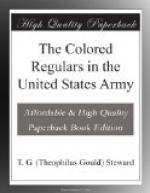After placing out sentinels, I lay down to sleep, but was quickly aroused by a great racket. Starting up I found some mounted and others in great confusion, one of the sentinels having given the alarm that we were about to be attacked. I ordered some to ride around and reconnoitre, and on their return the others being more alarmed, not knowing who they were, fled in different ways, so that I was reduced to about twenty again. With this I determined to attempt to recruit, and proceed on to rally in the neighborhood I had left."[6]
No one can read this account, which is thoroughly supported by contemporary testimony, without seeing in this poor misguided slave the elements of a vigorous captain. Failing in his efforts he made his escape and remained for two months in hiding in the vicinity of his pursuers. One concerned in his prosecution says: “It has been said that he was ignorant and cowardly and that his object was to murder and rob for the purpose of obtaining money to make his escape. It is notorious that he was never known to have a dollar in his life, to swear an oath, or drink a drop of spirits. As to his ignorance, he certainly never had the advantages of education, but he can read and write (it was taught him by his parents) and for natural intelligence and quickness of apprehension, is surpassed by few men I have ever seen. As to his being a coward, his reason as given for not resisting Mr. Phipps shows the decision of his character."[7]
The War of the Rebellion, now called the Civil War, effected the last and tremendous step in the transition of the American Negro from the position of a slave under the Republic to that of a soldier in its armies. Both under officers of his own race at Port Hudson and under white officers on a hundred battlefields, the Negro in arms proved himself a worthy foeman against the bravest and sternest enemies that ever assailed our nation’s flag, and a worthy comrade of the Union’s best defenders. Thirty-six thousand eight hundred and forty-seven of them gave their lives in that awful conflict. The entire race on this continent and those of allied blood throughout the




